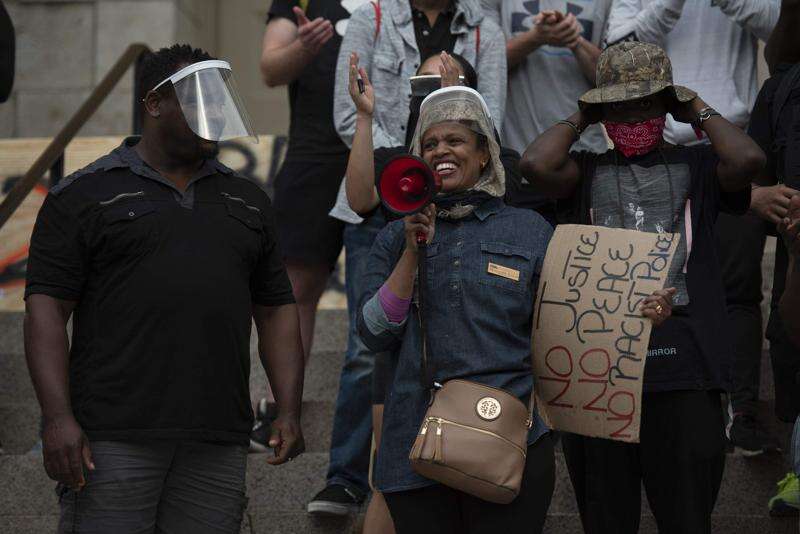Mayor Bruce Teague: ‘I really think that there’s a lot more work to be done and moving forward with this is a little hard for me’
IOWA CITY — Iowa City will spend nearly $200,000 to get its fledgling Truth and Reconciliation Commission — created in the wake of Black Lives Matter protests last summer — better organized and prepared to gather facts for a report on ways the community can address racial injustices.
While the City Council vote Tuesday night was unanimous — and not deferred for later like twice before — the decision wasn’t easy for Mayor Bruce Teague and Mayor Pro Tem Mazahir Salih, who needed additional time when it came down to vote.
Council members were in agreement the money was “well worth it” to help the panel with its organization and structure. While the vote was not specifically on hiring a firm to help, that’s where Teague’s and Salih’s reservations lay.
“We need to — and I’ve said this before — kind of just re-imagine something with this TRC,” Teague said. “The unification is a major issue for me.”
“I know we’re not approving the facilitator, but I really think that there’s a lot more work to be done, and moving forward with this is a little hard for me,” he continued.
The council voted almost a year ago to create the nine-member commission to gather testimony about racial injustices, foster ways for people to share their stories and to encourage direct conversations in the community. The commission is charged with issuing a report to the City Council by May 1, 2022, with recommendations for changes and to say whether the commission should continue its work or be disbanded.
But since then, the panel has been struck by resignations and a controversy over whether members should be paid to serve.
The resolution creating the panel contemplated hiring a facilitator at city expense to help the panel get organized and do its work. But the only firm that responded to a request for proposals for that job is — as Teague and Salih noted — not a local one. Kearns & West is a woman-owned strategic communication firm founded in 1984. The firm has offices in Texas, South Carolina, California, Colorado, Oregon and Washington, D.C.
Salih said she doesn’t think working from a distance will suffice.
“I just have hard time imagining how those people will reach out to our Black people,” Salih said. “I know how our people need to be reached. They need somebody in person. They need somebody here.”
Council member Susan Mims, however, said slowing down the process would “absolutely undermine any confidence that the TRC or the public has that this council was actually serious about the TRC being successful.”
“I agree that it will be helpful in certain aspects of this to have definitely had people on the ground here doing work, and as I read through this and look at this, I think that will happen,” Mims added.
The facilitator budget that was approved is broken down into five general tasks and costs, which are then divided into subcategories:
- Convening and understanding how the commission should work: $35,967.50
- Design of the fact-finding, truth-telling and reconciliation process: $27,570
- Fact-finding and truth-telling public process: $28,060
- Coordinate commission meetings: $68,412.50
- Report compilation: $15,050
The cost breakdown for all five tasks is $175,060, followed by additional technology and travel costs.
The budget approved Tuesday night did not include stipends for commissioners or back-pay for individuals who previously served on the commission — a point of contention during the previous two discussions.
The commission submitted its first six-month budget, estimated at $337,500, to the council in July asking for $1,000 a month for each of the nine appointed commissioners. There was also a request for back pay for meetings that have been held, as well as pay for members who have left. Pay for commissioners made up just under a third of the total budget.
City boards and commissions typically are unpaid positions, but commission members have advocated for stipends, citing the hours they dedicate to the work and trauma they feel hearing stories of racial inequity.
At the commission’s Sept. 2 meeting, members voted 7-1 in favor of submitting an updated budget. Commission members indicated at the meeting that with a facilitator’s help, they could accomplish additional goals including securing a stipend for each member.
“It’s not that the City Council doesn’t understand our position on the stipends. It’s that we have not presented a good argument,” Commissioner Daphney Daniel said Sept. 2. “ … We focus on one thing now and then with the help of the facilitator, we can reach the goals that we have set out, including getting that stipend.”
If the commission decides to proceed with Kearns & West as the facilitator, members will negotiate a contract that will be brought to the City Council. If approved there, the commission would work with Kearns & West to develop a preliminary budget for the panel.



